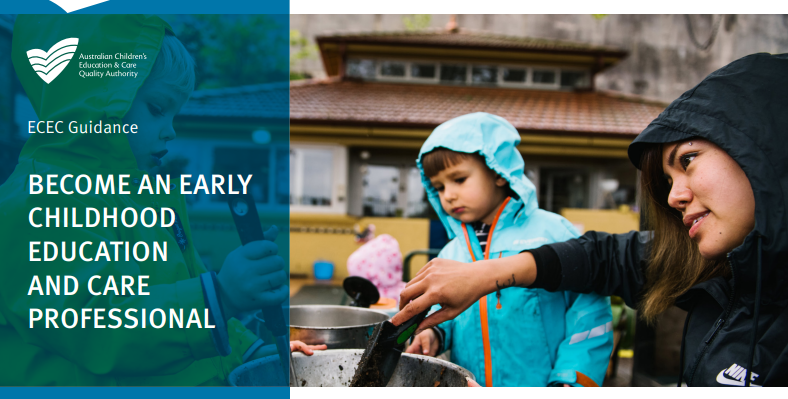Most long day care, family day care and outside school hours care services are regulated under the National Quality Framework (NQF). The NQF also applies to preschools (or kindergartens), except in Western Australia and Tasmania.
The National Quality Framework (NQF) for children's education and care is administered by regulatory authorities and the Australian Children’s Education and Care Quality Authority (ACECQA - pronounced a-see-kwa) that is an independent national authority, assisting governments in administering the NQF.

Here is a list of all currently existing types of services.
Note
Not all services are regulated under NQF (as outlined in the table below as well).
| Type | Ages | Hours of operation | Where | NQF Regulated? | Description and key benefits |
|---|---|---|---|---|---|
| Long Day Care (LDC) | Birth to school age | Usually 8-10 hours/day | Centre-based environment | Yes | Educators providing education and care to children in a centre-based environment offering extended hours. Provides preparation for school through a play-based learning curriculum. May suit parents working full time. |
| Family Day Care (FDC) | Birth to 12 | Varies | Educator's home | Yes | Educators providing education and care in their homes to small groups of children. May also offer OSHC. |
| Preschool (ACT, SA, NSW, NT) Kindergarten (QLD, TAS, VIC, WA) | 3 to 5 | Varies | Centre-based environment (standalone or part of a school | Yes | State-funded service that usually offers shorter hours or sessional education and care during school terms. Provides preparation for school through a play-based learning curriculum. It can be a standalone service or part of another education and care service or school |
| Outside School Hours Care (OSHC) or Out-of-School Hours (OOSH) | School age | Before/after school; holidays | Often in or near a primary school | Yes | Education and care for school age children before/after school. May also provide education and care during holidays and pupil-free days. Play-based curriculum with a focus on fun and leisure. Will suit working parents. |
| Occasional Care | Birth to school age | Varies | Varies | No | Casual care for short periods of time. Suitable for parents with short-term or last-minute needs. |
| Mobile services | Usually, birth to 6 | Varies | Usually local community centres/libraries etc. | Some have adopted the NQF | Mobile services most commonly travel through rural and remote areas to offer education and care to families who live too far away from permanent service. |
| Informal care | Varies | Varies | Home environment | No | Care options can include nannies, babysitters, family and friends. Provided on a needs’ basis. May be more accessible or cost effective for some families. |
Long Day Care/ Preschool / Kindergarden
Long day care is perfect for those who work long days and need care for their children during business hours. It operates for at least 8 hours a day, typically Monday to Friday in a child care centre and caters for children, from birth to school age. Some Long Day Care services have embedded into the service Preschools or Kindergardens. These programs provide children with the foundation and skills required for them to commence Primary School.
Below we are going to go on a tour of some Long Daycare Centres/ Preschools and Kindergarden facilities across Australia. Education and Care centres can be found in both Metropolitan and Rural settings and can be designed in many different ways. The videos we are showing are some examples of services, service types, we are not endorsing or affiliated with any of these services.
Out of School Hours Care
This type of care is for children that are school age and attend school. Out of School Hour Care services can be found on a school site, attached to a childcare centre or be in the community and requires children to travel to the services location. The shifts for a out of school care service range for before school care anywhere from 6am until school starts and when school finishes to anywhere up to 7pm at night. As well they tend to also provide Vacation Care for when school age children are on school holidays. Below look at some videos explaining and showcasing what Out of School Care looks like.
Family Day Care
Family Day Care is an alternative approach to early education. Unlike long day care where children and families need to attend a service, family daycare is set up in an educators home for them to provide care in a home based environment. To work in family daycare you need to be apart of a family daycare scheme, have a qualification in children services. Although you will be working by yourself you have a ratio of 1:4 when working with children under 6 years.
Occasional Care/ Mobile Services
Occasional Care and Mobile Service services are set up similar to long day care services. These services are typically used more as a transient type of care which still offer qualified education and care but families that access this service require care for short amount of time, and is usually community/ council funded. They tend to be pack up and pack away services that are set up in spaces.
Being an early childhood educator is not just a job, but it is a rewarding career where you can be part of children’s growth and development: you can assist them with their first steps, guide their learning and assist them explore the world around them.
In this short, 3-minute video created by a large, privately owned early childhood education and care provider, Only About Children (OAC), early childhood educators share their experience of being an educator:
The day-to-day tasks of an early childhood educator vary from service types, the age group you are working with and the actual role you are holding within the service. However, the main focus will always be on facilitating and supporting children’s wellbeing and learning and development.
In this short, almost 2-minute video Slavika shares her typical day as an Early Childhood Teacher at a G8 Education service:
Example of a Certificate III in Children Services job description:
| Job Description | |
|---|---|
| Job title: | Early childhood teacher (ECE qualified) |
| Responsible to: | Head teacher, center manager, center directors |
| Responsible for: | Children at Riverside Educare |
| Functional relationships with: |
Internal: All teachers, staff, management, children, parents and caregivers External: Other ECE establishments, primary teachers, visiting community members, community organisations, ministry representatives, support services, educationalists |
| Primary Objective/purpose: | To promote a quality learning environment with meaningful, and respectful relationships at the heart of what we do. To provide an early childhood education experience in sound and effective educational practice. In keeping with Te Whariki philosophies and Ministry of Education regulations. |
| Key tasks/functions: Performance standard competency/outcome/expected result | |
| 1. Learning and teaching: | Deliver a curricullum that reflects current understanding of sound and effective practice and ensure that day-to-day practice is aligned to the policies and procedures of Riverside Educare |
| 2. Team Responsibilities: | Participate in relevant administration and operational planning to support effective practice and foster collaboration with other staff |
| 3. Relationships: | Foster positive relationships with children and parents/whanau |
Next, let us have a look at a video from Starting Blocks explaining why some of the educators are in this job.
To find out more about working in the Early Childhood sector, read this ECEC guidance on becoming an early childhood professional factsheet from ACECQA.


